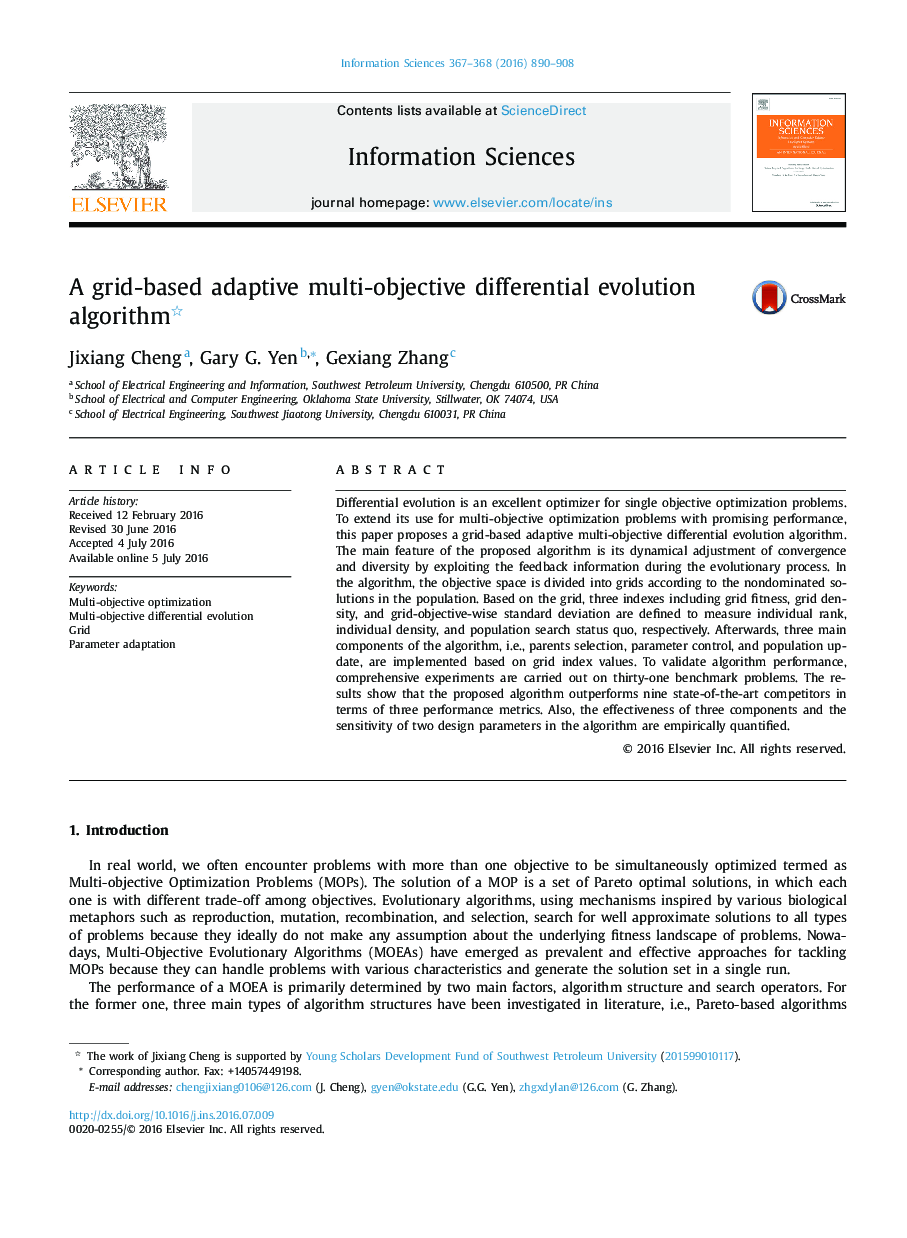| کد مقاله | کد نشریه | سال انتشار | مقاله انگلیسی | نسخه تمام متن |
|---|---|---|---|---|
| 6857283 | 661905 | 2016 | 19 صفحه PDF | دانلود رایگان |
عنوان انگلیسی مقاله ISI
A grid-based adaptive multi-objective differential evolution algorithm
ترجمه فارسی عنوان
یک الگوریتم تکاملی متقابل چند هدفه مبتنی بر شبکه
دانلود مقاله + سفارش ترجمه
دانلود مقاله ISI انگلیسی
رایگان برای ایرانیان
کلمات کلیدی
بهینه سازی چند هدفه، تکامل تکاملی چند هدفه، توری، سازگاری پارامتر،
ترجمه چکیده
تکامل دیفرانسیل یک بهینه ساز عالی برای مشکلات بهینه سازی یک هدف است. برای گسترش استفاده از آن به منظور بهینه سازی چند هدفه با عملکرد امیدوار کننده، این مقاله الگوریتم تکاملی دیفرانسیل چند هدفه سازگار مبتنی بر شبکه را پیشنهاد می کند. ویژگی اصلی الگوریتم پیشنهاد شده، تنظیم هماهنگی و تنوع دینامیکی آن با بهره گیری از اطلاعات بازخورد در طول فرآیند تکاملی است. در الگوریتم، فضای هدف با توجه به راه حل های نامشخص در جمعیت، به شبکه ها تقسیم می شود. بر اساس شبکه، به ترتیب سه شاخص شامل تناسب شبکه، چگالی شبکه و انحراف استاندارد استاندارد شبکه، برای اندازه گیری رتبه فردی، چگالی فرد و وضعیت جستجوی جستجوی جمعیتی تعیین می شود. پس از آن، سه جزء اصلی الگوریتم، یعنی انتخاب والدین، کنترل پارامترها و به روز رسانی جمعیت، بر اساس مقادیر شاخص شبکه انجام می شود. برای اعتبار عملکرد الگوریتم، آزمایش جامع بر روی مشکلات مربوط به سی و یکم انجام می شود. نتایج نشان می دهد که الگوریتم پیشنهادی از نظر سه معیار عملکردی، نه رقبایش را در مقایسه با رقبا به دست می آورد. همچنین، اثربخشی سه جزء و حساسیت دو پارامتر طراحی در الگوریتم، به صورت تجربی اندازه گیری شده اند.
موضوعات مرتبط
مهندسی و علوم پایه
مهندسی کامپیوتر
هوش مصنوعی
چکیده انگلیسی
Differential evolution is an excellent optimizer for single objective optimization problems. To extend its use for multi-objective optimization problems with promising performance, this paper proposes a grid-based adaptive multi-objective differential evolution algorithm. The main feature of the proposed algorithm is its dynamical adjustment of convergence and diversity by exploiting the feedback information during the evolutionary process. In the algorithm, the objective space is divided into grids according to the nondominated solutions in the population. Based on the grid, three indexes including grid fitness, grid density, and grid-objective-wise standard deviation are defined to measure individual rank, individual density, and population search status quo, respectively. Afterwards, three main components of the algorithm, i.e., parents selection, parameter control, and population update, are implemented based on grid index values. To validate algorithm performance, comprehensive experiments are carried out on thirty-one benchmark problems. The results show that the proposed algorithm outperforms nine state-of-the-art competitors in terms of three performance metrics. Also, the effectiveness of three components and the sensitivity of two design parameters in the algorithm are empirically quantified.
ناشر
Database: Elsevier - ScienceDirect (ساینس دایرکت)
Journal: Information Sciences - Volumes 367â368, 1 November 2016, Pages 890-908
Journal: Information Sciences - Volumes 367â368, 1 November 2016, Pages 890-908
نویسندگان
Jixiang Cheng, Gary G. Yen, Gexiang Zhang,
